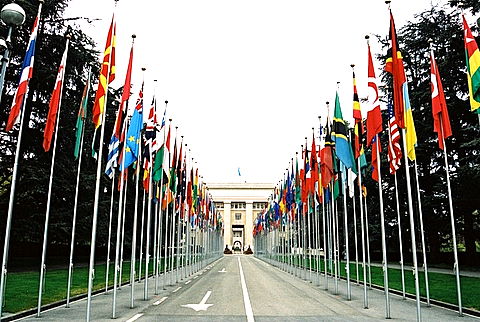On Wednesday 13 September, the Cairo Institute for Human Rights Studies (CIHRS) co-sponsored a side event, during the proceedings of the 21st session of the UN Human Rights Council (HRC) currently held on Geneva, on the occasion of the presentation of the first report of United Nations newly appointed Special Rapporteur on Truth, Justice, Reparation and guarantees of Non Recurrence, which was submitted to the Human Rights Council on Tuesday.
The event, which was principally hosted by Impunity Watch, was co-sponsored by a number of regional and international NGOs, including the International Federation for Human Rights, CELS, the International Service for Human Rights, TRIAL, the International Commission of Jurists, Forum Asia, Human Rights Watch, Lawyers Rights Watch Canada, IJR, Asian Legal Resource Center, Hivos, the World Lutheran Church Federation, and CIHRS.
Chaired by Alex Conte from the International Commission of Jurists, the panel included Special Rapporteur Pablo de Greiff, Marlies Stappers, director of Impunity Watch, Benjamin Mateo Jeronimo of the Asociacion por la Justicia y Reconciliacion in Guatemala, and Aloys Batungwanayo of Caravi, Burundi.
Special Rapporteur Pablo de Greiff briefly presented the report he submitted to HRC, pursuant to its resolution 18/7, which listed key activities undertaken by his mandate from 1 May to 25 July 2012 and described the foundations of, and the implementation strategy for, the mandate. He further emphasized the four key components that compromise his mandate- namely recognition, trust, reconciliation, and the rule of law- emphasizing their interdependence and complementarity. The mandate was created to respond to two types of post-conflict situation, namely post- authoritarian situations and instances of extreme vulnerability.
He also identified four expected challenges, both external and internal, that might arise during and within his mandate: the particular type of economic context currently defining international cooperation and how philanthropy works, the need to measure impact and the difference made through the mandate in a an intelligent way, the fact that transitional justice is envisioned through a security paradigm and not enough through a justice angle while to be effective the four components of the mandate need to be taken into account, and the risk of institutional overload.
Jeremie Smith, CIHRS Geneva Office Director, thanked the Special Rapporteur in his intervention from the floor and congratulated him on his first presentation to the Council. Smith stressed the extreme importance of this new mandate for the North African region, notably for Egypt, where transitional justice terminology is being used as a means to avoid accountability and to justify amnesties, which is not in line with justice.
CIHRS also made available to the audience a written brief on the issue of transitional justice highlighting the Human Rights violations that are taking place in the post-Mubarak era and examining to what extent each of the four components included in the Special Rapporteur’s mandate were being fulfilled. According to Smith, “The written brief served as a demonstration of the degree to which these four elements have been neglected in Egypt and the ways in which the process of transitional justice has been unclear and at best misguided.”
In response, the Special Rapporteur stated that he agreed with the CIHRS statement on the dangers of the misappropriation of transitional justice language to cover up amnesties, as exemplified by the press statement released by his office on Tuesday 11 September, stating that transitional justice was not “soft justice”: “Transitional justice is not the name for a distinct form of justice, but of a strategy for achieving justice for redressing massive rights violations in times of transition. Redress cannot be achieved without truth, justice, reparations and guarantees of non-recurrence,”
The 21st session of the Human Rights Council started on the 10th of September in Geneva and will last until the 28th. During these three weeks, key issues pertaining to human rights situations throughout the world will be debated and voted on.
Share this Post

